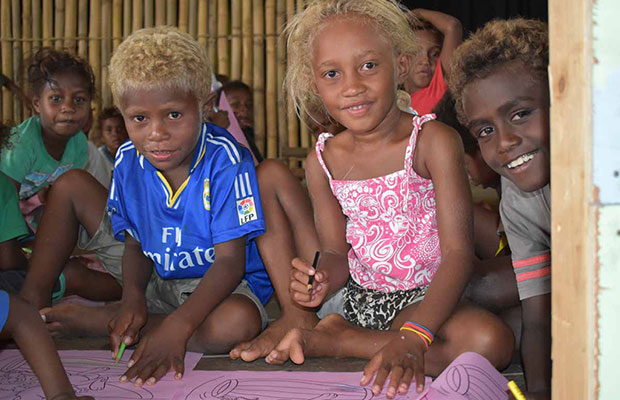
Overcoming Adversity in the Solomon Islands
In the poverty-stricken community of Ranadi, a suburb of Honiara in the Solomon Islands, overcoming economic adversity is an uphill battle for families—one often fought, and lost, in the trash heaps of the local dumps. Destitute parents often keep their children out of school to help them dig through garbage for recyclables to peddle in order to survive.
“This situation is familiar to our Salesian missionaries around the world,” says Father Mark Hyde, director of Salesian Missions. “When families are so poor that they can’t even meet their most basic needs—and constantly wonder where their next meal will come from—the math of sending their sons and daughters to school simply doesn’t add up. Why incur fees they can’t afford, when these children could be contributing to the family income instead?”
In many ways, the practical logic is hard to argue. This also contributes to a situation in which as many as 20 to 25 percent of youth never attend primary school. As a result, fewer than 35 percent of adults in the Solomon Islands are literate, which contributes to generational poverty.
“Not to mention the appalling conditions in which these children and families find themselves,” adds Fr. Mark. “Digging in trash hour after hour, day after day, presents the risk of injury or disease—and without access to medical care, which is virtually nonexistent in some areas of the islands, these ailments cannot be treated easily—another contributing factor to ongoing destitution.”
Since 1995, Salesian missionaries in the Solomon Islands have been working to reverse the tide. They offer programs specifically tailored to help marginalized and at-risk youth gain the knowledge and skills they need to secure decent jobs, support themselves and their families, and become active contributors to their country’s economic development. At the Don Bosco Technical Institute in Honiara, many students have participated in education and skills training in the electrician field, carpentry, auto mechanics and machine maintenance over the last 16 years. They have also benefited from life skills training and employment assistance. (Read an uplifting story about how some of these students donated their skills to assist victims of a devastating cyclone.)
In response to the situation in Ranadi, missionaries at the Don Bosco Technical Institute have launched a brand new educational initiative intended to improve financial prospects for both children and their families. Since March, they have been teaching as many as 70 kids, ages 4 to 13, how to read, write and improve their math skills. The Salesians have also provided additional opportunities for older students to train in welding, manufacturing and the hospitality sector.
“Still, we need to convince parents of the long-term value,” explains Fr. Mark. “If they allow their children to participate in these programs, how will they replace their lost income?”
A companion program, developed in parallel with these new educational initiatives, allows parents to use land on the Don Bosco Technical Institute’s campus to cultivate vegetables and sell them to the market for a more sustainable income.
“These are baby steps, certainly,” says Fr. Mark. “At the same time, with a population of fewer than 700,000 people, every effort we make to improve educational and financial opportunities for residents of the Solomon Islands can make a lasting and positive impact.”
Our mission brings education, job readiness and hope for a brighter future to marginalized youth and families around the world. What’s your mission?
Learn more about our work in the Solomon Islands.

